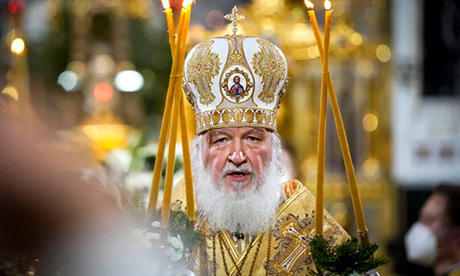“May the Lord preserve the Russian land… A land which now includes Russia and Ukraine and Belarus and other tribes and peoples.”
A Sunday sermon with very political overtones. It was delivered on February 27 at the Cathedral of Christ the Saviour in Moscow by Patriarch Kirill, head of the Russian Orthodox Church.
The 75-year-old patriarch castigated those who fight against the historical unity of Russia and Ukraine, calling them “evil forces.”
“Protect our common historical homeland”
“God forbid that the present political situation in fraternal Ukraine so close to us should be aimed at making the evil forces that have always strived against the unity of Rus’ and the Russian Church, gain the upper hand,” he said.
Rus’ is a medieval state, considered the ancestor of Russia, Ukraine and Belarus.
Kirill, who was elected patriarch in 2009, has been relatively discreet about Russia’s invasion of Ukraine. But he clearly supports the vision of the Russian power regarding the unity of the two countries.
“It must not be allowed to give the dark and hostile external forces an occasion to laugh at us; we should do everything to preserve peace between our peoples while protecting our common historical Motherland against every outside action that can destroy this unity,” he said on Sunday, while praying for the return of peace.
Restoring the greatness of Russian Orthodoxy
Kirill remained silent during Russia’s annexation of Crimea in 2014. But this time he’s displayed more pronounced support.
The context has changed since 2019 when the Patriarchate of Constantinople officially recognised the Ukrainian Orthodox Church’s independence from the Moscow Patriarchate. This ended 332 years of Russian religious tutelage over the Ukrainian faithful.
It was a decision the Patriarchate of Moscow saw as an unbearable affront since Ukraine is considered the historical cradle of Russian Orthodoxy.
And it is this Russian Orthodox that Patriarch Kirill wants to return to all its grandeur.
He is one of the most powerful religious dignitaries in the world, heading a Church that has 36,000 parishes and more than 100 million faithful.
Kirill has made it his mission to bring back to the fore a Church that almost disappeared during the Soviet era, in Russia and around the globe.
“Putin remains the master”
On the national scene, the patriarch does not hesitate to lean on the regime of Vladimir Putin — younger than him by six years — with whom he shares an obsession for the greatness of Russia.
Kirill supports the legitimacy of the regime, which in return allows him to extend his influence on society through the defense of traditional values.
President Putin offers the patriarch political and financial support and has said that he sees the Russian Orthodox Church as a “natural partner.”
“For Vladimir Putin, religion serves social order and family morality. In exchange, the Church and its patriarch bring religious discourse to the ideology in place,” said Jean-François Colosimo, a historian and theologian.
“But it is an unequal exchange, because Putin remains the master. Kirill behaves as a kind of minister of religious affairs and, like any of Putin’s ministers, must show submission,” he pointed out.
But who really is Patriarch Kirill?
He was born Vladimir Mikhailovich Gundyayev in 1946 in Leningrad and is the heir of a Church that was persecuted for more than 70 years, from the October Revolution to the collapse of the Soviet bloc.
His father and grandfather were both Orthodox priests who died in the Gulag. And in 1960 the young Gundyayev entered the seminary, being ordained nine years later under the name Kirill.
The budding theologian was quickly identified as a future leader for the Russian Church.
His rapid rise to prominence included an appointment in Geneva as the Russian Church’s representative to the World Council of Churches (WCC). He then headed the Moscow Patriarchate’s office for external religious (i.e. ecumenical) relations for 20 years (1989-2009).
In 2009, he was elected patriarch under the name of Kirill I, succeeding Alexey II.
No warm relationship with Putin
“Since then, the Patriarch of Moscow and all Russia has been committed to carrying the message of Vladimir Putin’s regime, wherever the patriarchate is historically present, in the whole territory of the former USSR,” explained Colosimo.
But he stressed that the two men do not have a warm relationship.
Kirill’s support of Putin’s power is somewhat dictated by challenges inside his Church, especially from a fringe that is more nationalistic, anti-Western and anti-ecumenical than he is.
He thus became the first Patriarch of Moscow to meet a Roman pope when he and Pope Francis met in 2016 in Cuba.
Now, six years later, another meeting is under consideration, even if its preparation has become a lot trickier given the context of the war in Ukraine.
- Arnaud Bevilacqua writes for La Croix from France
- First published in La-Croix International. Republished with permission.
